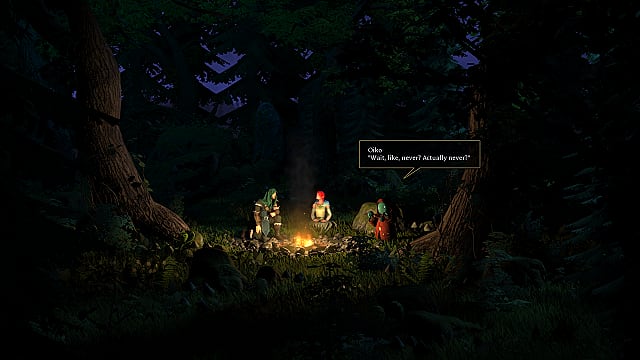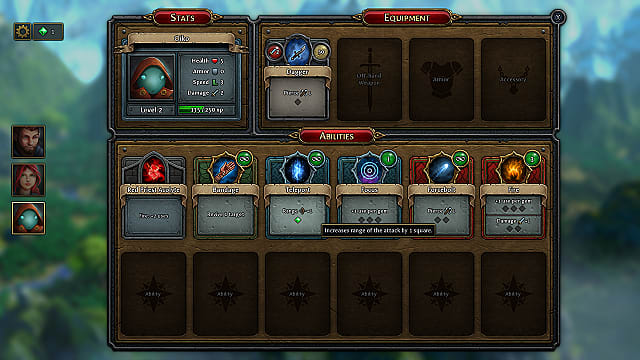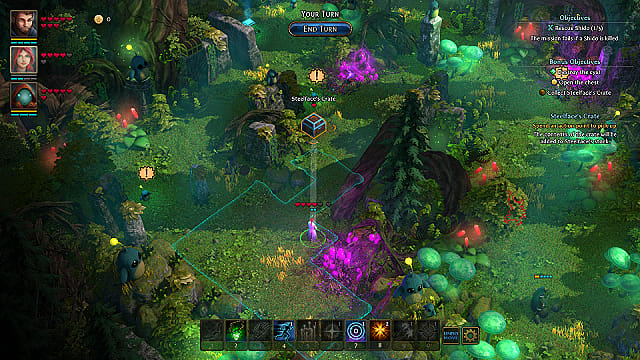

Druidstone: The Secret of the Menhir Forest, the fledgling release from developers Ctrl Alt Ninja Ltd., has a surprisingly robust yet malleable take on the turn-based strategy genre. Unfortunately, its story is largely forgettable, revolving around an Acolyte, a Warden, and a Scout as they seek to end a strange corruption that’s spreading across the forest.
You can name the protagonists, which adds a spark of meaning to their plight, but the tiny embers are quickly snuffed out. Not only is the game packed with backstory and references that it doesn't immediately explain, but it's also guilty of droning on.
Some cutscenes feel almost as long as the missions that proceed them, totally killing any momentum that the fast-paced, fluid combat generates. Within a few hours, I was resigned to holding space to skip the pages of text and get back into the action. The option to do so is a welcome addition that makes the game far more enjoyable.
Even so, Druidstone is lovely to look at, and the cutscenes can present some gorgeous landscapes. The scenery and models during combat are visually impressive for an Indie title, too, though the audio is a little generic and may get on your nerves.

Thankfully, the combat more than makes up for the game’s shortcomings. Each mission starts with a cutscene before jumping into your first turn. You aren't limited to moving before you attack or vice versa, and you can use mobility tools with skills in any order you like.
You can also undo movements, which is exceptionally handy if you accidentally trigger an enemy's reaction attack. Unfortunately, you lose the option to rewind if you change characters, and you aren't able to undo attacks.
This would have been the epitome of user-friendly interaction, but it would also remove some of the finality in the decision-making process, something that makes turn-based strategies so enticing. A large number of spells or abilities will have limited use per mission, and it’s the conservative use of these that will make or break your quest.
Every character can also equip up to two weapons that don't have limited uses, so you have to plan around these. If you’re sloppy and waste the spells where regular weapon attacks would suffice, you’ll most likely hit a brick wall near the end of the level. Be frugal with your single-use tools, however, and you just might scrape through.
The consequences of your actions are especially punishing in Druidstone, with the game's normal difficulty besting me on multiple occasions until I learned the optimal strategies. There's no shame in dropping the difficulty, which can be done on a mission-by-mission basis, with even easy difficulty providing its fair share of tricky encounters.
The game's higher difficulties generally just threw more enemies at me, rather than making resources scarce or limiting the use of game-changing spells, which was a shame. It felt like it was funneling me to play a certain way, prioritizing the ability to attack multiple targets per turn above anything else.

Once you've leveled up your party and kitted them out with the best gear and weapons, though, you really start to feel like a strategic god, capable of solving any issue that's thrown your way using just your small band of fighters.
There’s a surprisingly versatile set of tools available for your party members, and finding the perfect time to use each one is vital to success. Each mission will have primary and secondary objectives, which reward you with experience, gold, or power gems.
Between missions, you use these to improve and adjust your party as you see fit. The power gems can be used to boost the effectiveness of weapons and armor, or increase the number of times you can use spells.
The ability to swap these out freely is incredibly useful, especially if a specific mission calls for a certain playstyle; you can easily tailor your builds to that level and try again. On top of this, the missions don’t have to be completed in a set order, allowing you to abandon a tough level and return later once you’ve bolstered your party.
Though there are 35 levels, they aren't all available immediately and some are only short puzzles, so you can't put things off forever. However, there's still plenty of ways to tackle your 10- to 20-hour playthrough. Druidstone did crash a few times during my playthrough, artificially inflating this timer, but the frame rate and performance were smooth throughout.
While the crashes were frustrating in the moment, the game writes to a handy log file that can be sent to the developers. They swiftly patched out a few problems I forwarded their way, and have expressed their strong resolution to keep updating the game.

Pros
- User-friendly take on turn-based combat
- The intricate modular upgrade system is a joy to tinker with and micromanage
- Freedom to complete missions in any order
Cons
- Forgettable, lengthy story weighs down the momentum
- Difficulty can be oppressive, pushing you towards a specific playstyle
- Audio is derivative and repetitive
Druidstone: The Secret of the Menhir Forest failed to entice me with its extensive expositions, but the brilliant combat system thoroughly hooked me. There are some stellar tools available to the player, and I really liked how modular everything felt.
You're given a lot of options in Druidstone and what you do with them will shape your success or feed your failure.
The developer's passion and plans to release modding tools to the community makes this an enticing future prospect.
[Note: A copy of Druidstone: The Secret of the Menhir Forest was provided by Ctrl Alt Ninja Ltd. for the purpose of this review.]
0 comments:
Post a Comment